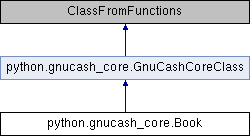Inheritance diagram for python.gnucash_core.Book:

Public Member Functions | |
| def | InvoiceLookup (self, guid) |
| def | EntryLookup (self, guid) |
| def | CustomerLookup (self, guid) |
| def | JobLookup (self, guid) |
| def | VendorLookup (self, guid) |
| def | EmployeeLookup (self, guid) |
| def | TaxTableLookup (self, guid) |
| def | TaxTableLookupByName (self, name) |
| def | TaxTableGetTables (self) |
| def | BillLookupByID (self, id) |
| def | InvoiceLookupByID (self, id) |
| def | CustomerLookupByID (self, id) |
| def | VendorLookupByID (self, id) |
| def | InvoiceNextID (self, customer) |
| def | BillNextID (self, vendor) |
| def | CustomerNextID (self) |
| def | VendorNextID (self) |
 Public Member Functions inherited from python.gnucash_core.GnuCashCoreClass Public Member Functions inherited from python.gnucash_core.GnuCashCoreClass | |
| def | do_lookup_create_oo_instance (self, lookup_function, cls, args) |
Detailed Description
A Book encapsulates all of the GnuCash data, it is the place where
all GnuCash entities (Transaction, Split, Vendor, Invoice...), are
stored. You'll notice that all of the constructors for those entities
need a book to be associated with.
The most common way to get a book is through the book property in the
Session class, that is, create a session that connects to some storage,
such as through 'my_session = Session('file:my_books.xac')', and access
the book via the book property, 'my_session.book'
If you would like to create a Book without any backing storage, call the
Book constructor without any parameters, 'Book()'. You can later merge
such a book into a book with actual store by using merge_init.
Methods of interest
get_root_account -- Returns the root level Account
get_table -- Returns a commodity lookup table, of type GncCommodityTable
Definition at line 413 of file gnucash_core.py.
Member Function Documentation
◆ BillNextID()
| def python.gnucash_core.Book.BillNextID | ( | self, | |
| vendor | |||
| ) |
Return the next Bill ID.
Definition at line 502 of file gnucash_core.py.
◆ CustomerNextID()
| def python.gnucash_core.Book.CustomerNextID | ( | self | ) |
Return the next Customer ID.
Definition at line 507 of file gnucash_core.py.
◆ InvoiceNextID()
| def python.gnucash_core.Book.InvoiceNextID | ( | self, | |
| customer | |||
| ) |
Return the next invoice ID.
Definition at line 496 of file gnucash_core.py.
◆ VendorNextID()
| def python.gnucash_core.Book.VendorNextID | ( | self | ) |
Return the next Vendor ID.
Definition at line 512 of file gnucash_core.py.
The documentation for this class was generated from the following file:
 1.8.14
1.8.14